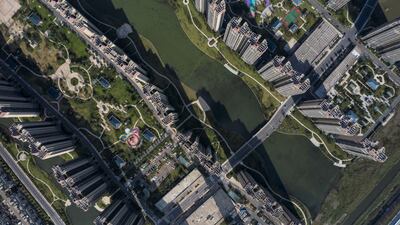Evergrande Group, China's second-biggest property developer by sales, is not yet experiencing a “Lehman moment” despite being on the brink of default with $300 billion in outstanding debt, according to ratings agency S&P.
“It is unlikely that it would become one. The issue is largely a Chinese domestic issue and more than likely will play out that way,” Gavin Gunning, senior director of financial institutions at S&P, said during a webinar organised by the ratings agency on Tuesday.
In September 2008, US investment bank Lehman Brothers filed for bankruptcy, marking the biggest corporate failure in US history, which had reverberations across the world and led to the consolidation of financial institutions and the demise of others. It also led to some companies selling large stakes to governments in order to be bailed out. The Wall Street titan of its time, Lehman Bothers drowned under huge losses linked to subprime mortgages.
Evergrande, the world’s most debt-ridden property developer, has come under increasing scrutiny in recent months as the company grapples with a severe liquidity crisis due to a staggering debt pile of $300bn, stoking broader concerns about the reach of the crisis beyond China's borders and the property market in the world's second-largest economy.
On Monday, concerns sparked a sell off, dragging stock markets down with the decline also mirrored across cryptocurrencies.
However, a global spill over of the current crisis in China’s property market is unlikely, according to S&P.
Evergrande has less than 600bn Chinese yuan ($92.79bn) in government loans, according to Kim Eng Tan, senior director and sector lead of sovereign ratings for APAC at S&P.
“The Chinese government remains very much in control of the country’s liquidity situation. There are no spillovers that are expected to cause chaos in China and no large impact is seen on other borrowers,” he added.
Evergrande's stock price is down 85 per cent since the start of the year.
On Tuesday, its shares slipped further after S&P said that the developer could default on its payments. The company's share price dropped as much as 7 per cent on Hong Kong's benchmark Hang Seng stock index before paring back losses to 0.4 per cent – a near 10-year closing low.
Last week, S&P downgraded Evergrande's ratings, along with two other developers in the country – Hengda and Tianji – to “CC” from “CCC”.
Earlier this month, Evergrande hired financial advisers, highlighting a probable debt restructuring of the company that would be viewed as a default if it went ahead, S&P said.
Banks, home buyers, investors, bondholders, suppliers and contractors are among those affected by the company’s default risk.
“The government would prevent a default if they believe that it could increase the risk … if the contagion will cause a systemic risk to the economy,” Mr Kim said.
“The government will not wait for the Evergrande problem to become a property sector problem,” he added.
“I don’t believe they [the government] would stop a default. They will look to minimise economic losses. They would also try to reduce the risk to home buyers.”
A bailout by the government will only come if they see any systemic risk or political troubles increasing, according to S&P. “But we don’t see that happening right now,” Mr Kim said.
Meanwhile, Chinese banks’ exposure to Evergrande is relatively small, according to S&P. However, two banks in particular are expected to be most affected by the company's debt crisis: the affiliated Shengjing Bank and national Minsheng Bank, S&P said.
“Banks [in China] will have some measures to help the property developers to potentially tide over the short-term liquidity shocks,” Ming Tan, director of financial institutions at S&P, said. “From what we understand, the [Chinese] government tends to give the banking system time to adjust, including to the property exposure.”
Chinese banks have started to trim down their exposure to Evergrande amid credit tightening and negative news headlines, Matthew Chow, director of corporate ratings at S&P, added.
“Negative news contributed to downwards spiral of Evergrande,” Mr Chow said.
However, investors in the Chinese property market will have to bear some losses eventually, “especially the high-net-worth ones and institutional investors”, according to Mr Tan.
“It will lead to a loss of confidence in the short term, but confidence will return in the longer term,” he said.
Protests by homebuyers and investors demanding their money back and seeking answers from company executives have broken out in recent days at Evergrande’s headquarters in the southern city of Shenzhen, as well as its offices across the country.
Evergrande Real Estate owns more than 1,300 projects in 280 or more cities in China, serving about 12 million home owners, according to its website. Its property services arm, which listed on Hong Kong Exchanges and Clearing in December 2020, has about 2,800 projects in more than 310 cities in China.
Evergrande has a bond interest payment of $669 million due this year, including a $83.5m note due on September 23.


